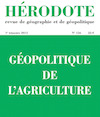Bientôt on comptera des dizaines de millions de paysans sans terre en Afrique subsaharienne
Résumé
Depuis qu’elle a lancé en Afrique subsaharienne la vaste entreprise dite de « sécurisation des terres » au début des années 1990, la Banque mondiale tente de substituer le droit universel de propriété individuelle de la terre à la gestion collective des parcelles paysannes, profondément inscrite dans la culture et dans les faits depuis des siècles.
Bien plus qu’une simple mutation des droits, et sous couvert de parfaite légalité, ce processus va entraîner une véritable révolution agraire, mais dans le mauvais sens du terme : les petits paysans africains vont vendre leurs champs peu compétitifs aux grands groupes agro-industriels (accaparement ou land grabbing) et se retrouver sans terre, comme en Amérique latine. Ainsi des dizaines de millions de migrants intérieurs iront grossir les bidonvilles des grandes agglomérations urbaines, accroissant l’insécurité alimentaire, sanitaire et sociale dans des pays déjà très instables.
Tant que le modèle économique des grandes plantations à haute productivité n’inclura pas dans la réalité des prix de revient le coût de cette insécurité sociale, et en attendant une réponse socioéconomique globalement pertinente, les campagnes africaines, démographiquement très chargées, risquent de devenir des territoires explosifs.
Abstract : Soon we will be counting tens of millions of landless farmers in sub-saharan Africa
Ever since big business launched in sub-saharan Africa at the beginning of the 1990s with a declaration of « security of tenure », the World Bank has attempted to substitute the universal right of individual land tenure for the collective management of peasants plots, impacting deeply on the culture and reality of centuries.
More than a simple mutation of rights, and under ostensibly sound legal protection, this process will lead to a veritable agricultural revolution but in the worse sense of the term : small-scale farmers will sell their barely competitive fields to large, landgrabbing, agro-industrial monopolies and end up with no land, as in Latin-America. Because of this tens of millions of domestic migrants will swell the numbers of already large, built-up, urban shanty towns, thus increasing food, sanitary and social insecurity in already unstable countries.
As much as the economic model of large, highly productive plantations does not include the real cost of this social insecurity, and while in the meantime waiting for a relevant global, sociology-economic response, overpopulated African countries risk becoming ticking time-bombs.
Tweeter cet article Suivre @RevueHerodote sur TwitterL’institut Français de Géopolitique offre des formations de master intenses, exigeantes et passionnantes !
Hérodote est historiquement liée à la formation en géopolitique (master et doctorat) de l’Université Paris 8 — Vincennes - Saint-Denis, l’Institut Français de Géopolitique (IFG) où ont enseigné son fondateur Yves Lacoste, sa directrice Béatrice Giblin (également fondatrice de l’IFG), et une partie importante de l’équipe de la revue.
La première année est consacrée à la formation à et par la recherche, qui est au cœur du projet intellectuel et citoyen de l’École France de Géopolitique. Les étudiants et les étudiantes doivent écrire un mémoire de recherche d’une centaine de page appuyé sur une enquête de terrain d’un mois en autonomie. Un accompagnement fort leur est proposé pour favoriser leur réussite durant cette année si différente de leurs expériences précédentes.
En seconde année, quatre spécialisations professionnalisantes sont possibles : géopolitique locale et gouvernance territoriale, géopolitique du cyberespace, nouveaux territoires de la compétition stratégique, analyse des risques géopolitiques et environnementaux. Toutes ces spécialisations sont ouvertes à l’alternance, et la majorité des étudiants et des étudiantes a désormais un contrat d’apprentissage. Celles et ceux qui souhaitent faire une seconde année de recherche le peuvent, notamment en préparation d’un projet de doctorat.
Avec 85 places en première année, le master de l’IFG offre aussi une véritable vie collective de promo, animée notamment par une association étudiante dynamique. Les étudiantes et étudiants viennent de nombreuses formations et disciplines, notamment : géographie, d’histoire, de droit, de sociologie, de science-politique, Économie et gestion, langues (LLCE/LEA) ou de classes préparatoires.
Les candidatures en première année de master se font exclusivement via la plateforme nationale monmaster.gouv.fr du 26 février au 24 mars 2024. Toutes les informations utiles se trouvent sur le site www.geopolitique.net. En deuxième année, les candidatures doivent passer par le site de l’Université. L’IFG n’offre pas de formation au niveau licence.










